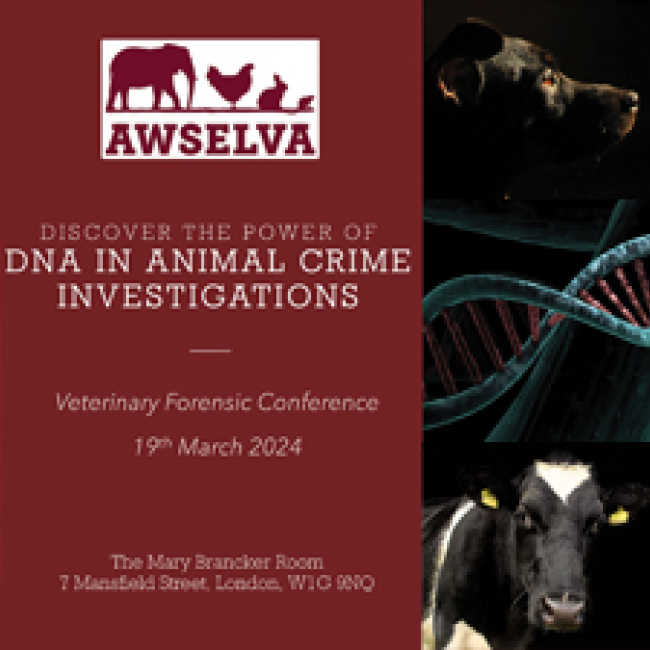
The Mary Brancker Room
7 Mansfield Street
London
W1G 9NQ
United Kingdom
Discover The Power of DNA in Animal Crime Investigations at AWSELVA’s Veterinary Forensics Conference, which will be held on Tuesday, March 19th in The Mary Brancker Room at 7 Mansfield Street, London W1G 9NQ.
The conference programme is as follows:
10.00-10.30 – Arrival and coffee/tea
10.30-11.15 – "DNA: Silk purse or sow's ear?" - Dr Simon Newbery, BSc(hons) BVetMed MSc (Forensic Science) MRCVS, Veterinary Surgeon, Forensic Scientist, Veterinary Forensics Consultant to the National Crime Agency, United Kingdom. Abstract: While DNA analysis can be a powerful tool in animal investigations by forensic veterinarians, it is important to consider the advantages and disadvantages when utilising it in a case. Also, what practical alternatives can be used by the Forensic Veterinarian?
11.30-12.15 – "DNA use in Canadian animal cruelty cases " - Dr Margaret Doyle, BSc MVB MSc MRCVS, Forensic Veterinarian, VCA Canada Riverbend Animal Hospital, Canada.
Abstract: Dr. Doyle will present case examples illustrating DNA evidence use in animal cruelty investigations in Canada. Utilization of DNA can successfully establish breeding and origin of animals abandoned in distress, as well as identify species in illegal poaching. Use of DNA to definitively tie an animal to a crime scene assists in proving legal care and control of animal victims of violence in urban settings. These cases will illustrate a variety of scenarios utilizing DNA to identify animal victims, both living and deceased, and human perpetrators of abuse.
12.30-13.15 – Buffet lunch
13.30-14.15 – “The Canine DNA Recovery Project: Current Findings and Next Steps" - Dr Nicholas Dawnay, BSc PhD MSc, Senior Lecturer, School of Pharmacy and Biomolecular Sciences, Liverpool John Moores University, United Kingdom. Abstract: The Canine DNA Recovery Project (CDnaRP) is a collaborative forensic project that aims to develop best practice methods for the collection and analysis of dog DNA recovered from attacked livestock and wildlife. The project works closely with police and forensic practitioners to optimise and standardise methods and also works with special interest groups including vets, rural insurers, farmers, and charities to ensure stakeholder awareness of the research and how it relates to livestock and wildlife offences involving canines. Our research to date has developed and validated a robust qPCR assay for canine DNA quantification.
The method acts as an important quality control step in the forensic DNA analysis pipeline and has allowed us to assess the effectiveness different DNA recovery techniques such as swabbing, taping, and cutting. Other areas of our research have revealed the extent to which PCR inhibitors and livestock DNA prevent PCR amplification and canine DNA profile interpretation and has identified mitigation steps leading to improved data quality. To build on these findings, our project is soon beginning an exciting new phase involving ‘citizen science’. This research is developing and testing field collection kits for police and rural stakeholder groups to use in the event of a livestock attack. The distribution of these kits will allow a greater number of samples to be collected for the research and will begin to understand whether non-enforcement groups such as farmers themselves can collect admissible evidence in the future.
14.30-15.15 – “The use of DNA profiling in livestock crime investigations” - Dr Richard Ellis, DPhil, Head of Genome Analysis, Animal and Plant Health Agency, United Kingdom.
Abstract: The Animal and Plant Health Agency is at the forefront of livestock disease testing in Great Britain and has developed DNA based methods to ensure the provenance of samples; confirmation that a given tissue or blood sample originated from the animal in question.
The methods, based on well-established short tandem repeat (STR) panels for cattle and sheep, are primarily used for testing assurance. However, there have been an increasing number of requests to investigate livestock crime, from both law enforcement agencies and farmers themselves.
The evidence providing by DNA profiling has aiding in successful prosecution for several cases and has highlighted the benefits of this approach where other evidence is deemed insufficient.
15.30-16.00 – coffee/tea break
16.00-17.00 – Q&A session with the panel.
17.00 – Close
The day-long conference is open to all AWSELVA, and non-AWSELVA members.